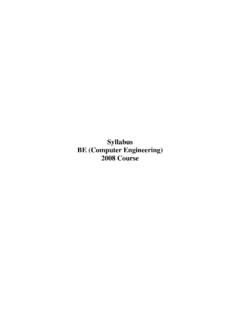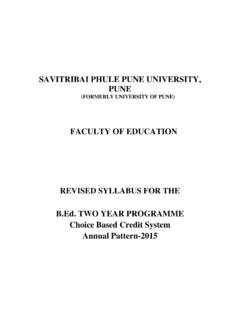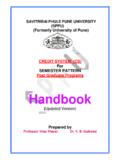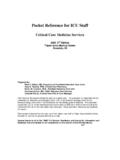Transcription of SYLLABUS FOR POST GRADUATE DIPLOMA IN …
1 SYLLABUS FOR POST GRADUATE DIPLOMA IN hospital . management ( pgdhm ) revised . academic Year : 2009-2010. Eligibility for Admission: The Eligibility rules for the above Post GRADUATE Course shall be as under: Bachelor's Degree in any Faculty of any Statutory University or Equivalent DIPLOMA awarded by the Board of Technical Education of any State/Central Government- Post SSC- 3 years DIPLOMA with 2 years experience after passing the DIPLOMA . Post HSC- 2 years DIPLOMA with one year experience after passing the DIPLOMA . General Nursing & Midwifery (GNM)- 31/2 years course after HSC. conducted by Nursing Council of any State with one year experience after passing GNM course. Objectives of the Course : To train Medical & Non-Medical Graduates in the specialty of the hospital Administration to meet the growing demand of hospital Administrators at the middle level of management .
2 To enable such persons to take up consultancy in the hospital Planning. To enable them to take up higher courses of learning /specialization in the field of hospital management in due course of time. Structure of the Course: The course will have Two Semesters. Each Semester consisting of 6 papers carrying 100 marks each paper. The outline of the course is given below: i SEMESTER I. COURSE SUBJECT TITLE EXAMINATION MARKS. CODE INTERNAL/ EXTERNAL 30+70=100. 101 Principles and Practices of External 100. management & Organizational Behaviour 102 Managerial Accounting & Financial External 100. management 103 hospital Planning External 100. 104 Medical Terminology & Procedures External 100. 105 hospital Administration External 100. 106 Viva Voce on Journal Related to Internal 100.
3 hospital Training SEMESTER II. COURSE SUBJECT TITLE EXAMINATION MARKS. CODE INTERNAL/ EXTERNAL 30+70=100. 201 Human Resource management External 100. 202 Laws Related To hospital Medical External 100. Services 203 Material management & Inventory External 100. Control 204 Healthcare & Administration Of External 100. Clinical & Non-Clinical Services 205 Project Report & Viva Voce based on External 100. Project Report 206 Computer Fundamentals & Software Internal 100. Related To Hospitals ii ASSESSMENT: 1. The papers marked as External are meant for External evaluation by the University & carry 100 marks. Out of which (70) marks are reserved for University evaluation & (30). marks are reserved for Internal evaluation based upon the Written Examination. The Internal evaluation will be carried out by the individual Institute for which proper records will be maintained.
4 2. Marks for the Internal Evaluation must be communicated by the Institute to the University before the commencement of relevant Semester Examination. 3. Evaluation Pattern of Course Code 106 & 206. 30 marks for Class-room performance, class attendance &. tutorials. 70 marks for end Semester examinations conducted by respective Institute. STANDARD OF PASSING: 1. The minimum standard of passing will be 40% marks in each paper separately, for internal as well as external heads. 2. BACKLOG: The student will be allowed to carry maximum backlog of 4 (four) heads of passing. iii GRADES: S. No. Marks Range (%) Class/Grade 1 70-100 First Class with Distinction 2 60-69 First Class 3 55-59 Higher Second Class 4 50-54 Second Class 5 40-49 Pass Class 6 Below 40 Fail INTERNSHIP: On successful completion & passing of Semester-I & Semester-II.
5 Examinations, students will have to complete Internship Training in Hospitals, for a period of not less than 60 working days, as a part of the course. Hospitals will be allotted by the Director/Principal of the Institute/College. DIPLOMA will be awarded only after the completion of Internship. The Institute will collect the required Internship Completion Certificate from the concerned hospital . The Institute will submit this Certificate to the University.. iv POST GRADUATE DIPLOMA IN hospital management . FOR 2009-2010. INDEX. COURSE SR NO. COURSES PAGE NO. CODE. SEMESTER I. 101 1 Principles and Practices of management & Organisational 1. Behaviour 102 2 Managerial Accounting & Financial management 4. 103 3 hospital Planning 7. 104 4 Medical Terminology & Procedures 9. 105 5 hospital Administration 12.
6 106 6 Viva Voce on Journal Related to hospital Training 15. SEMESTER II. 201 7 Human Resource management 16. 202 8 Laws Related to hospital & Medical 18. Services 203 9 Material management & Inventory Control 21. 204 10 Healthcare & Administration of Clinical & Non-clinical Services. 24. 205 11 Project Report & Viva Voce based on Project Report 26. 206 12 Computer Fundamentals &. Software Related to hospital 27. management v revised SYLLABUS OF. POST GRADUATE DIPLOMA IN hospital management . COURSE. academic YEAR 2009-2010 ONWARDS. SEMESTER I. COURSE 101. Principles and Practices of management and Organizational Behavior Hours 01. Basic concepts of management 04. Definition Evolution of management Thought Functions of management Taylor and Henry Fayol's contribution. 02. Planning 04.
7 Nature and Purpose Setting Objectives management by Objectives Steps and Hierarchy of Plans. 03. Organizing 04. Nature and Purpose Departmentation Line and Staff Authority - Decentralization Centralization Authority Responsibility Accountability and Power. 04. Directing 04. Communication Process of Communication Hierarchy Maslow's Need of Hierarchy and Herzberg two factor theory vi Leading Trait Theory, Blake and Montain's Managerial Grid, Hersey Blanchard's Situational Leadership. 05. Controlling and Coordinating 04. Process of Controlling PERT. CPM. Work Study Operations Research Quality Circles Kaizen 06. Decision making 04. Nature & purpose Principles 07. Organizational Behavior 04. Definition Importance Historical Background Fundamental Concepts of OB. 21st Century Corporates Different models of OB autocratic, custodial, supportive, collegial & SOBC.
8 08. Personality & Attitudes 04. Meaning of Personality Development of Personality Nature & dimensions of attitude Job Satisfaction Organizational Commitment 09. Motivation 04. Motives Characteristics Classification of Motives Primary Motives Secondary Motives Morale Definition & relationship with productivity vii Morale Indicators: Theories of Work motivation Maslow's Theory of Need Hierarchy Herzberg's Theory of Job Loading 10. Group Dynamics & Teams 04. Theories of Group Formation Formal Organization & Informal Groups & their interaction Importance of teams Formation of teams Team Work Total Hours 40. Course 101. Books Recommended: 01. Essentials of management By Harold Koontz & Heinz Weihrich 7th Ed. Tata McGraw Hill. 02. Essentials of management By Joseph L. Massie Prentice Hall India.
9 03. management of Organisation Behaviour By Paul Hersey &. Blanchard Prentice Hall India. 04. Organisational Behaviour By John W. Newstrom Tata McGraw Hill. 05. Organisational Behaviour By Fred Luthans McGraw Hill Intl. 06. management Information System By Dr. Pardeshi &. Others. 07. management : Tasks, Responsibilities & Practices By Peter Drucker Allied Publisher. viii 08. Practice of management By Peter Drucker Allied Publisher. **. COURSE 102. Managerial Accounting & Financial management Hours 01. Introduction 2. Origin of Accounting & its importance Different disciplines in Accounting Difference between Accounts, Costing, Finance, Taxation, Audit, etc. 02. Double Entry System of Accounts 4. Transactions Debit & Credit Classification of Accounts Rules of Accounts Convention, concepts & norms of Accounts Advantages of Double Entry System of Accounts 03.
10 Journal 6. Types of Journals/Subsidiary Books Passing of Journal Entries, writing of narrations. 04. Ledger 2. Posting in Ledger Balancing of Ledger Accounts 05. Preparation of Trial Balance 3. Correction of mistakes in Trial Balance Difficulties in locating the mistakes & its consequences 06. Depreciation 2. Why depreciation? Mode of Depreciations. ix 07. Preparation of Final Accounts 6. Profit making Hospitals Non-profit making Hospitals.. 08. Working Capital management 4. Needs of Working Capital Estimation of Working Capital requirement Different sources of funds Norms to be considered for Bank Loans 09. Changes in Financial Statements 4. Ratio Analysis Limitation of Ratio Analysis. 10. Budgetary Control 5. Difference between Budget, Estimate & Projection Types of Budget with special reference to Functional Budget How to monitor a Budget 11.

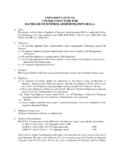
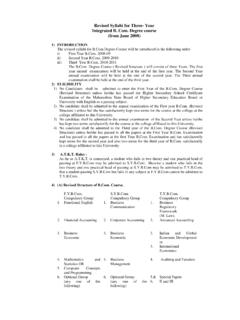
![[4372]-101 - Savitribai Phule Pune University](/cache/preview/f/c/3/4/c/a/0/f/thumb-fc34ca0f7a382c46206f2b1007598e60.jpg)

